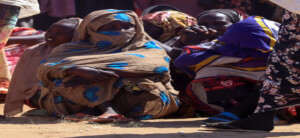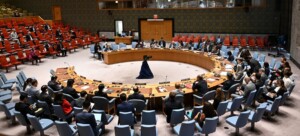Deposed Sudan dictator Al Bashir officially charged by Khartoum judge
On Saturday, Judge El Sadig Abdelrahman formally indicted ousted President Omar Al Bashir for illegal ownership of wealth and suspicious richness and possession of foreign currency.
 Omar Al Bashir appears within a security cage at the start of his graft trial in Khartoum (Social media)
Omar Al Bashir appears within a security cage at the start of his graft trial in Khartoum (Social media)
On Saturday, Judge El Sadig Abdelrahman formally indicted ousted President Omar Al Bashir, who ruled Sudan for 30 years before being deposed by a military coup d’état on April 11, for illegal ownership of wealth, suspicious richness, and possession of foreign currency. Al Bashir implicated the former director of his office – who has since been arrested – and testified that the Saudi Crown Prince was the source of the cash.
The decision to formally charge Al Bashir came after the accused former leader responded to questions from the court from a cage within the highly secured Judicial and Legal Science Institute in Khartoum. The court also weighed the testimony of several witnesses who were questioned last week.
As reported by Radio Dabanga in April, a substantial amount of cash was seized during a search of Al Bashir’s residence in Khartoum. In a statement at the time, the Senior Public Prosecutor Mutasim Mahmoud announced the seizure of $351 million, €6,7 million, £5.2 million, and SDG 5 billion ($105 million). Some of the cash found was shown to reporters. It had been packed in sacks designed for 50kg of maize meal.
Giving evidence for the prosecution last week, a detective testified that during questioning by investigators following his detention, Al Bashir admitted to receiving ‘millions of dollars’ from Saudi Arabia.
Saudi millions
At Saturday’s hearing, giving evidence himself for the first time, Al Bashir told the court that the money arrived in a private aircraft, through the director of the office of (Saudi Crown Prince) Mohammad bin Salman.
In response to a question by the judge as to why he had not deposited the amount in the treasury of the Bank of Sudan, Al Bashir said that the bank would have asked about the source of these funds: “We did not do so because Bin Salman asked not to be named.”
Al Bashir testified that the director of his office, Hatim Bakheet received the amount.
He told the court that he had disbursed the money he received from Bin Salman to the Military Hospital, the International University of Africa, and the Teiba satellite channel, as well as €5 million handed over to the feared Rapid Support Forces (RSF) government militia – then and now commanded by Lt Gen Mohamed Hamdan ‘Hemeti’ who served as deputy chairman of the Transitional Military Council after the coup, and is now deputy chairman of the transitional Sovereign Council.
Al Bashir said he wished the court hearing could have been held in camera so that that he would not have to name Bin Salman publicly. The accused added that he preferred not to return the money to him [Bin Salman] “so that he would not be embarrassed with Saudi Arabia”.
Following Al Bashir’s testimony on Saturday, the Anti-Corruption Prosecutor arrested Hatim Bakheet, the former director of Al Bashir’s office, for further investigation regarding the charges facing Al Bashir.
Sources on Sunday that the competent prosecution file complaint against Bakheet related to criminal participation in crimes related to foreign currency and the Emergency Law No 3 and 6 of 2019.
Detainees
While Al Bashir appeared in court, members of the Sovereign Council Aisha Mousa and Rajaa Abdelmaseeh, visited Kober Prison in Khartoum North to visit detained cadres of the former regime to ensure their presence in prison.
Detainees Ahmed Haroun and El Haj Ata El Mannan raised two memoranda to the Sovereign Council. Abdelmaseeh promised them they will study the memoranda.
Our editorial independence means that we can continue to provide factual updates about political developments to Sudanese and international actors, educate people about how to avoid outbreaks of infectious diseases, and provide a window to the world for those in all corners of Sudan. Support Radio Dabanga for as little as €2.50, the equivalent of a cup of coffee.












 and then
and then